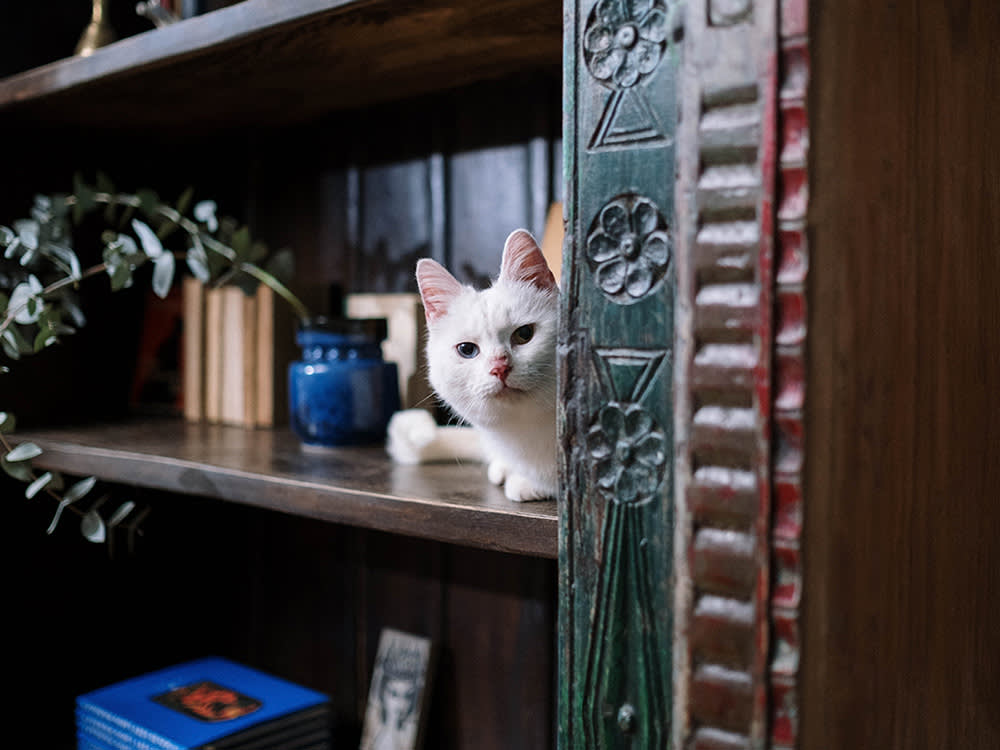Why Is My Cat Hiding?
No, they’re not on the lam. Here are four reasons your cat might be MIA.
Living with a cat can feel like you’re playing a nonstop game of hide and seek. Are they under the bed? Behind the couch? In the closet? Whether your cat has a favorite hiding spot or frequently finds new places to escape from view, it’s totally normal for cats to hide. Here are four reasons your cat may be hiding out — and suggestions for how to handle a cat who prefers to be out of sight.
1. New Home
Don’t be surprised if the sweet, purring kitten you fell in love with at the shelter scampers under the bed and refuses to come out when you bring them home. Hiding is a normal reaction in an unfamiliar environment, according to Dr. Jill A. Goldman, certified applied animal behaviorist and founder of DJG Animal Behavior Services. “[Cats] need time to settle in,” she says. “The ability to go to a hiding place — a safe space — without being disturbed allows the cat to feel more comfortable in a new place.”
The Solution:
Provide a cat carrier, tunnel, covered cat bed, or other safe space for your new family member to hide and allow them to come out when they’re ready. Remember to keep all of their resources, including a litter box and food and water bowls, close to their hiding spot until your cat settles in and feels comfortable exploring the house.
2. Illness
Just as you may hide out in bed when you’re not feeling well, your cat may retreat to a secret spot if they’re injured or sick. The reason? Survival. In the wild, illness or injuries make cats vulnerable to predators, says Dr. Marci L. Koski, certified feline behavior and training consultant at Feline Behavior Solutions. Those survival instincts remain strong, so your cat may retreat to a hiding space to feel more secure when they’re not feeling well.
How much do you spend on your pet per year?
Solution:
If your normally social and snuggly cat suddenly refuses to come out of the closet or spends more time hiding than usual, call the vet. “The key thing to watch for is a change in behavior,” says Dr. Koski. “You need to be concerned if hiding impacts other behaviors like eating, drinking, or using the litter box.” Treating the ailment will make your cat feel better, which should bring them out of hiding.
3. Stress
Cats are sensitive to changes in their environment, so a new home, new pet, new baby or even changes to their routine could cause your cat to feel stressed out, according to Dr. Koski. Look for patterns to their hiding behavior: Does your cat hide during the morning get-out-the-door rush or when the kids come home from school? “For some cats, hiding [happens] at a specific time of day, which correlates with activity levels in your home,” Dr. Koski adds. “If you have a busy home…where kids or other animals are constantly seeking out the cat for interaction, cats will find a few places to hide to have some alone time. It puts them out of sight, out of mind.”
Solution for Stress:
Honor your cat’s need for alone time and make sure that they have ample hiding spots in your home; leave the closet door open or offer vertical spots (like a clear spot on the top of the bookshelf) to allow your cat to get out of the fray, Dr. Koski advises. “If there’s a specific spot you’d like your cat to [hide], put a heated cat bed in that area,” she adds.
4. Fear
Your cat may be afraid of fireworks, thunderstorms, barking dogs, or other unfamiliar sights or sounds. Aggression between cats in the house can also cause stress; watch how your cats interact to make sure that one cat isn’t bullying another, forcing them to retreat. When faced with a potential threat, cats will retreat to avoid contact. It’s not hard to identify a scaredy cat. Cats who are afraid often have their ears pulled back, hair standing on end, pupils dilated, and are curled up into balls to appear smaller.
Solution for Fear:
Fear-based hiding allows cats to avoid contact with a perceived threat and is usually temporary. When the storm ends or the fireworks stop, cats will feel relaxed enough to come out of hiding and go on with their lives. In the meantime, give your cat time to decompress and a special spot to retreat to when they’re afraid. “If you disturb them, it’s no longer safe,” Dr. Goldman says. “Leave the cat alone when they’re hiding.”
Dr. Goldman also suggests a pheromone diffuser. The cat-calming scents have been proven effective for easing anxiety (and anxiety-related behaviors like urine marking). You can plug a diffuser into the wall near your cat’s favorite hiding spot.









